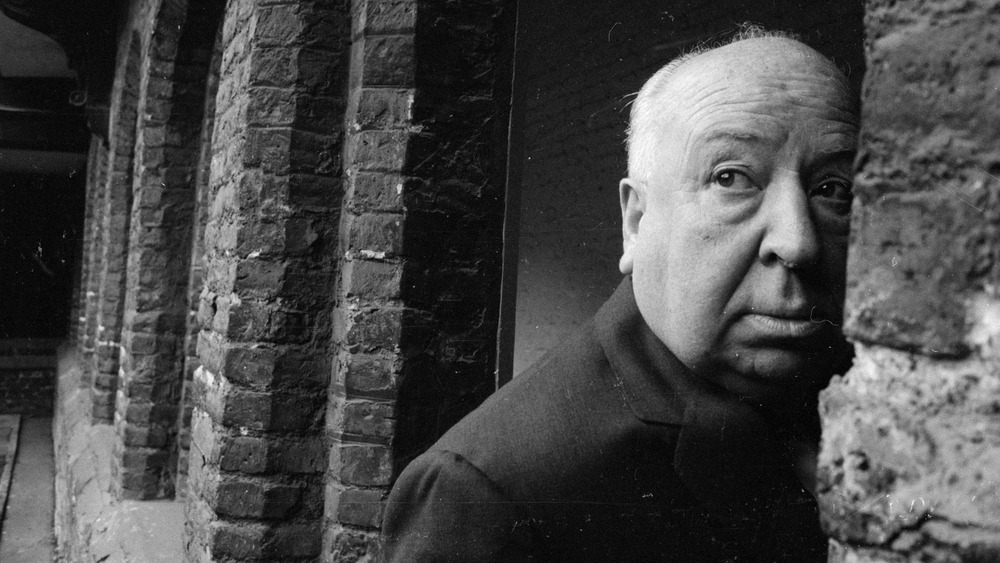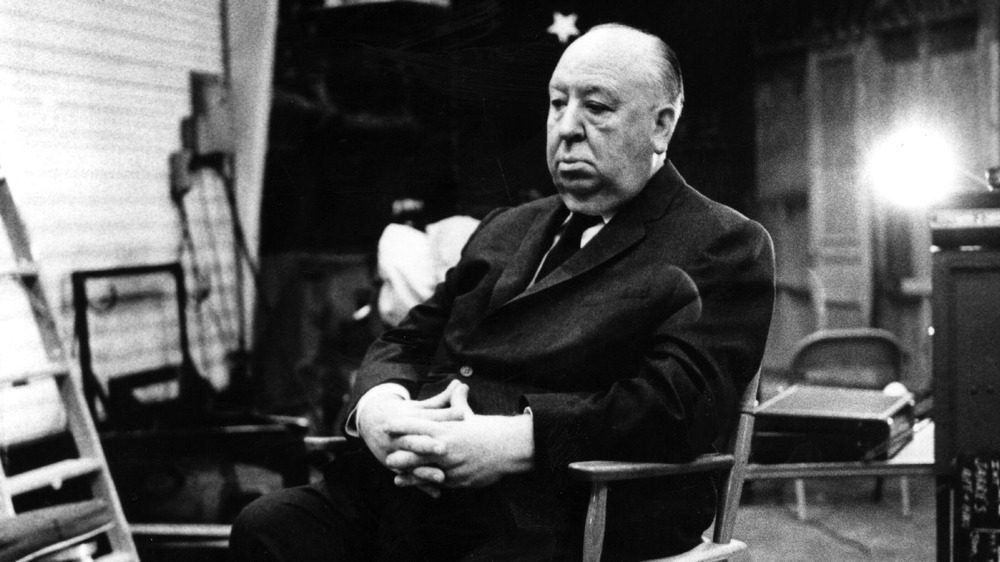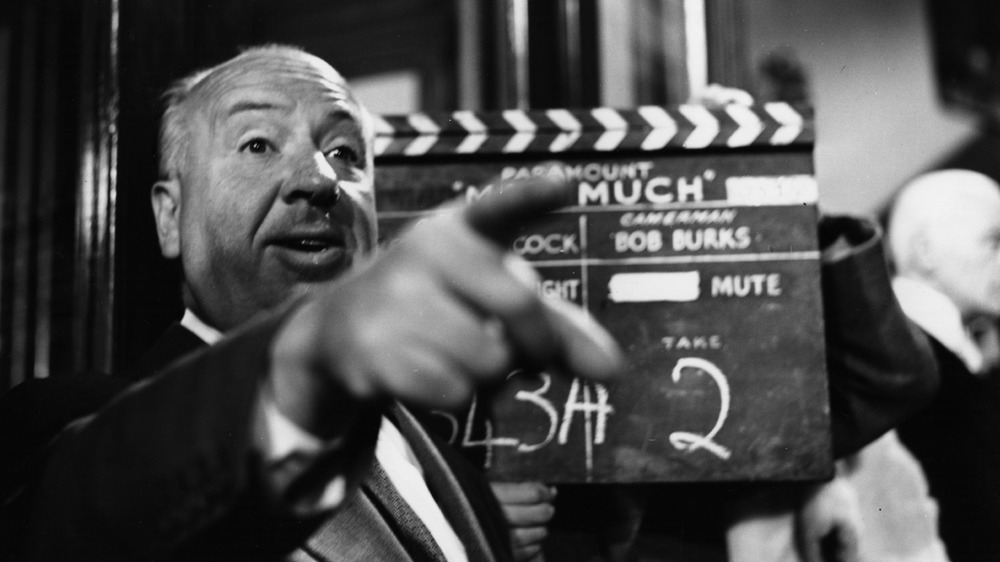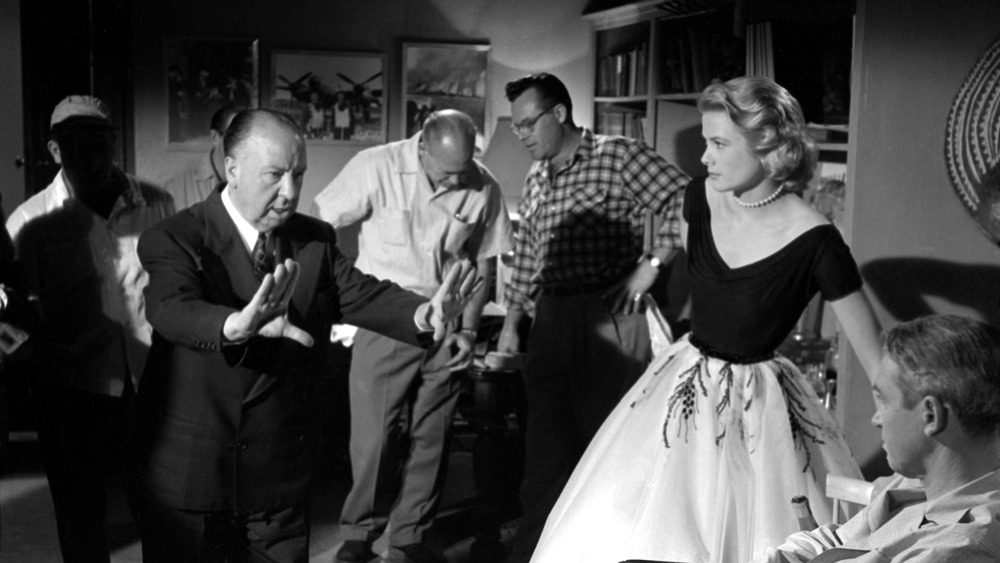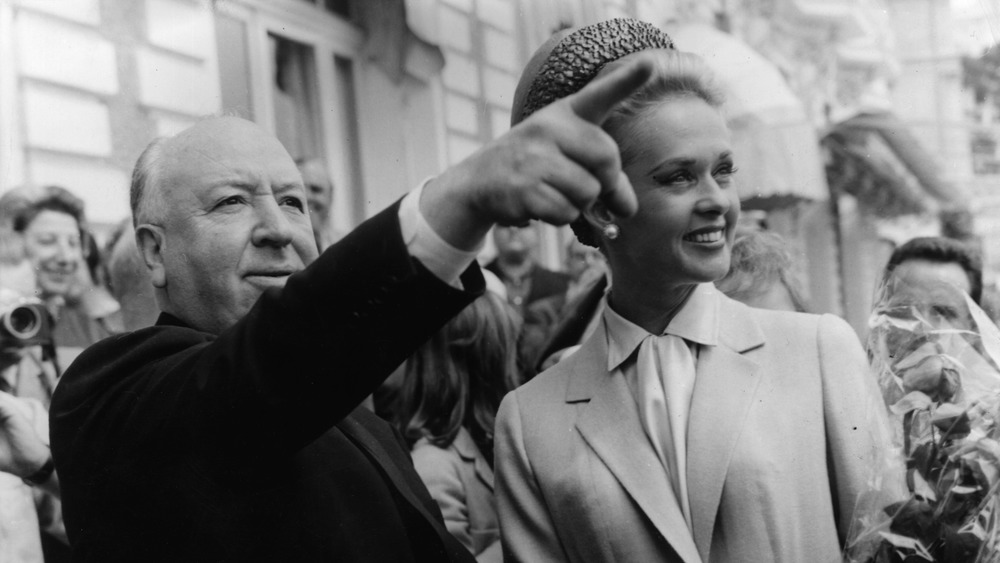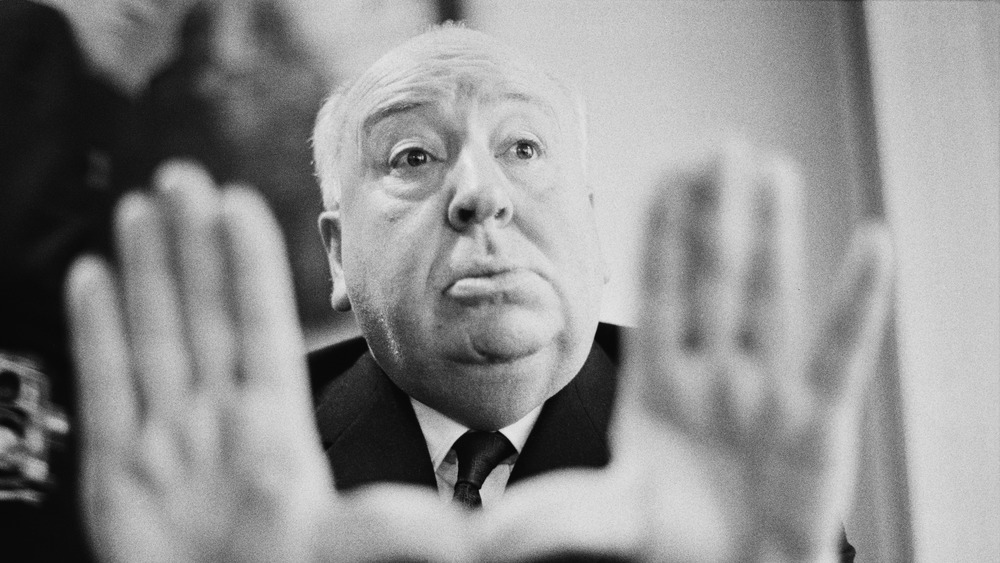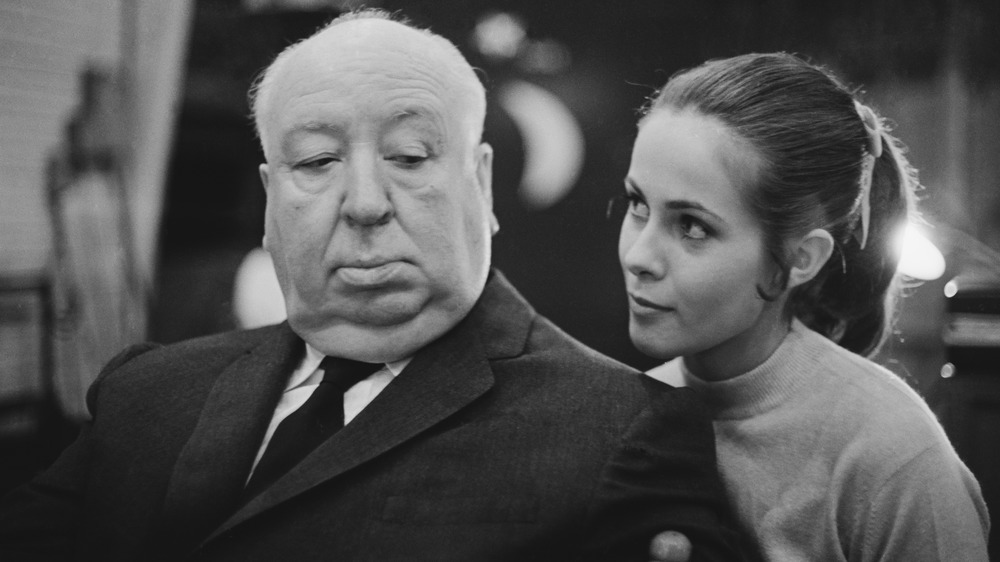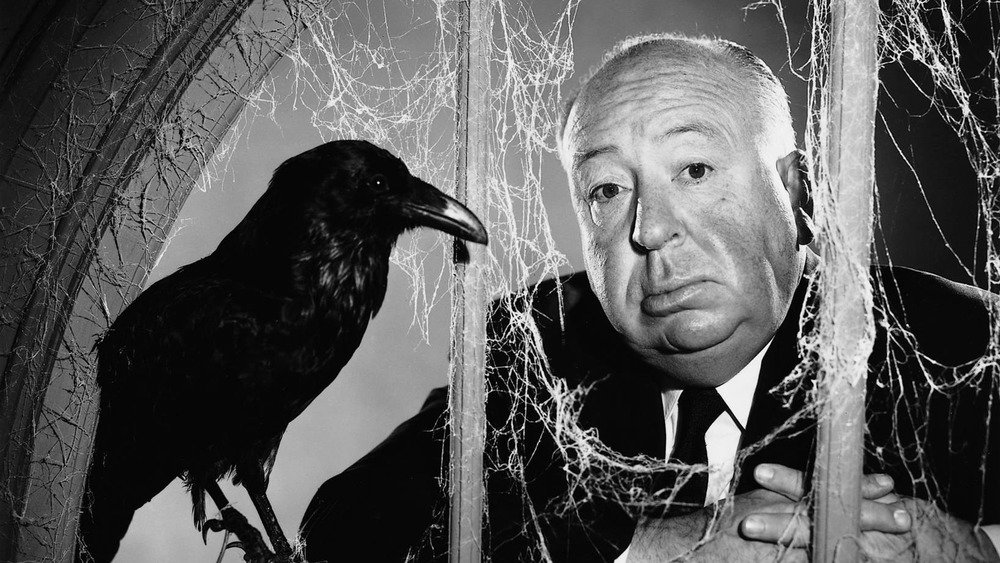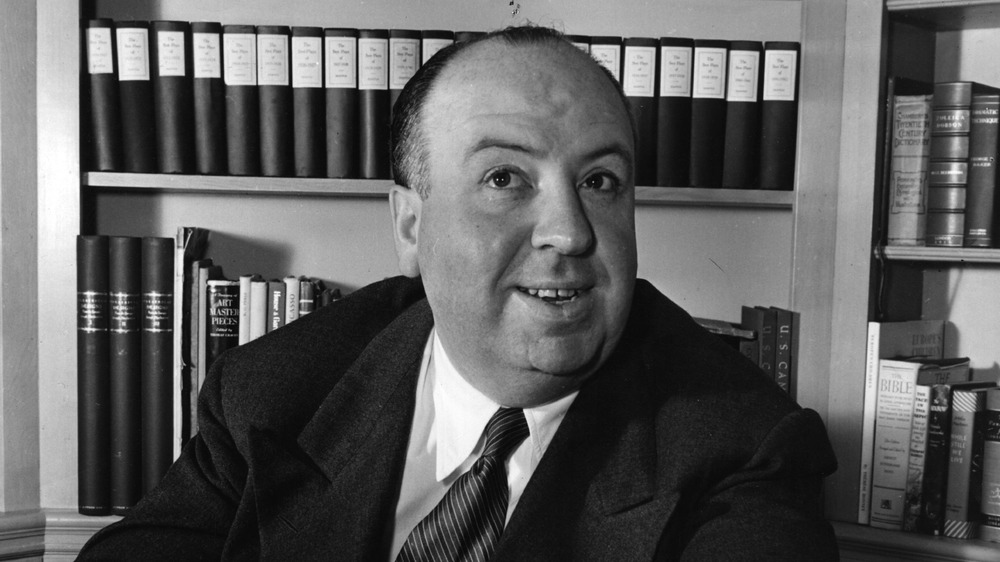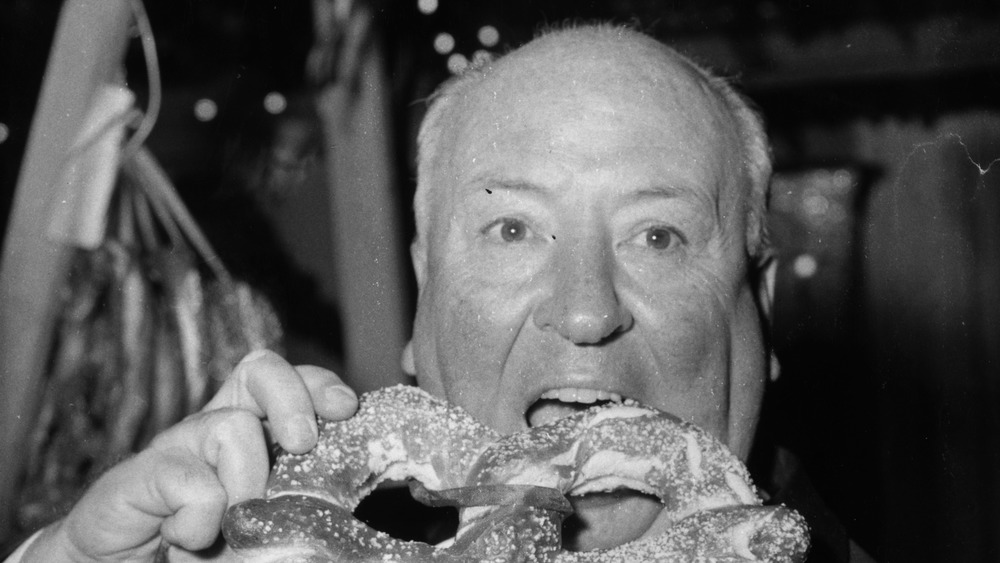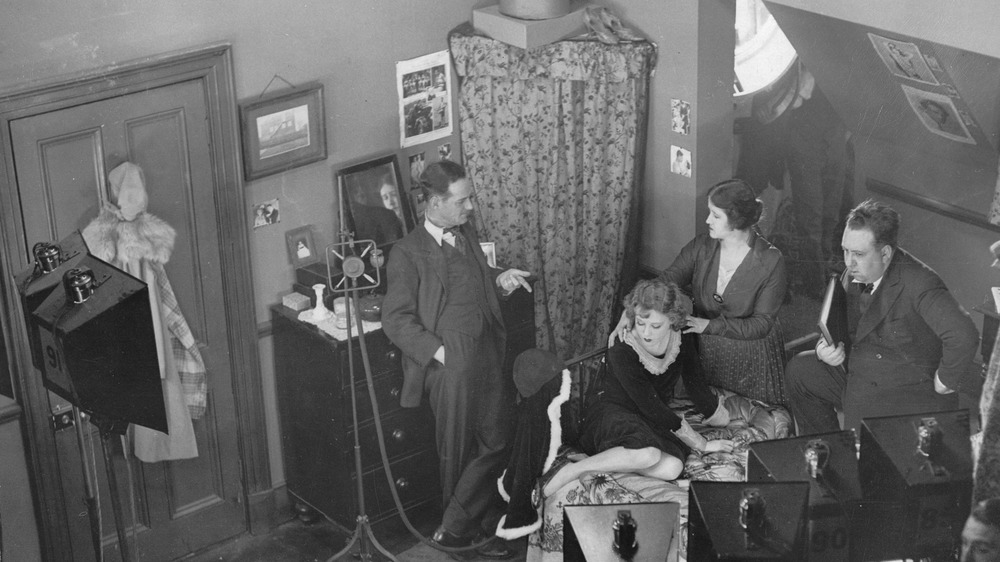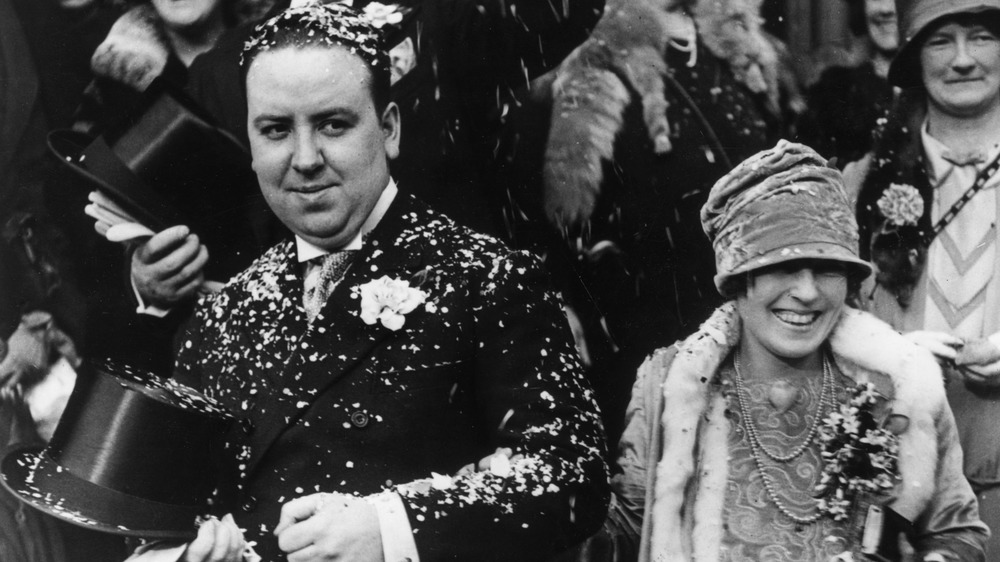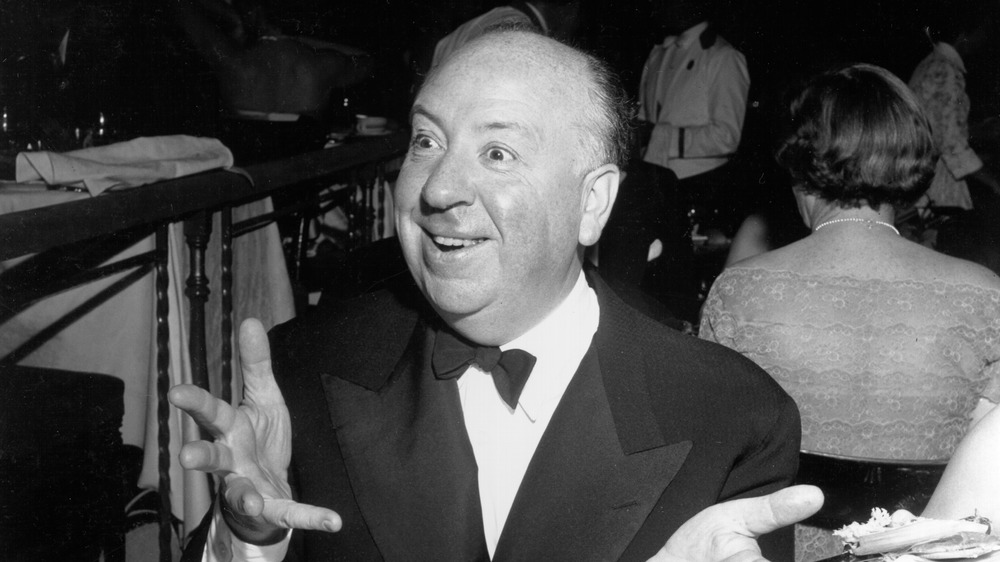Rules Actors Had To Follow In Alfred Hitchcock Movies
Alfred Hitchcock was one of the best directors to ever sit in the chair. He made a number of revered, classic films, including Vertigo, which many consider to be one of the greatest movies ever made. Like many great directors, though, Hitchcock could be a bit particular about what he wanted from his collaborators. This was true of his editors, his production designers, his cinematographers, and especially of his actors.
Over the course of his career, Hitchcock worked with a number of legendary performers from his era, and many of them more than once. He made films with Jimmy Stewart, Grace Kelly, Ingrid Bergman, and Cary Grant, and each one of them did great work in several of his films. Some actors thought the world of the director, while others were a little less willing to dole out praise for his work with actors. No matter who you were, though, Hitchcock had very specific rules for how you should behave on set, and what your role should be in his film.
Hitchcock made all final decisions
Different directors work with their actors in a variety of different ways. Some allow their actors to have an active role in shaping not just their character, but the overall story that they're trying to tell. For other directors, though, actors are not allowed to have nearly as much agency over what happens in the film. That was definitely the case for Hitchcock, who expected actors to simply show up and do their job. The creative decisions were for him to make, and any input that they had could be overruled if Hitchcock disagreed.
At one point, Hitchcock famously told Truffaut that "actors are cattle." Later, when he was asked about that vivid description, he denied saying it. "I said that I would never say such an unfeeling, rude thing about actors at all," he explained on the Dick Cavett Show. "What I probably said, was that all actors should be treated like cattle...In a nice way of course."
Hitchcock was always in charge, and he expected his actors to behave instinctually without thinking, much in the way that cattle might.
No improvisation allowed
As anyone who has watched one of Alfred Hitchcock's movies might know, the director has often been obsessed with the idea of control. That theme surfaced in many of his films, and it was also true of his behavior on set. In his conversations with Truffaut, the two of them discussed the improvisational nature of the work that Truffaut had done on Jules et Jim, and Hitchcock seemed amazed at the French director's willingness to give up some control of his actors.
For Hitchcock, the job of an actor was to show up on set and recite the lines in the script. Hitchcock was working inside a system that very much treated actors that way, even as different methods of performance began to emerge in the later part of his career. Hitchcock never really worked with method actors, though, so it's hard to say how he would have reacted to their insistence that they have a role in shaping who their character is. In all likelihood, he wouldn't have appreciated it too much.
Work on characters and story should not be up to actors
The method way of performing brought with it a desire among actors to play an active role in shaping their characters. Those decisions could be as small as jewelry or hair style or as big as what a character ultimately says and does. This idea, which has become quite common among the biggest actors of recent years, seemed to Hitchcock to be completely separate from the work an actor was supposed to do.
In fact, the director even gave an interview in 1967 in which he explained why method acting was so anathema to him. "I remember discussing with a method actor how he was taught and so forth." Hitchcock explained. "He said, 'We're taught using improvisation. We are given an idea and then we are turned loose to develop in any way we want to.' I said 'That's not acting. That's writing.'" Hitchcock simply didn't believe that an actor was supposed to guide a movie's story. An actor's job was to perform a task that they had been hired to complete.
Good actors 'do nothing well'
Hitchcock wasn't just opposed to method acting, he actually believed that great actors were great because they did exactly the opposite. "The chief requisite for an actor is the ability to do nothing well, which is by no means as easy as it sounds," Hitchcock said in his interview with Truffaut. The director thought that an actor's chief responsibility was to be compelling without doing much at all. They should be interesting to audiences not because of their actions, but because of something innate inside of them.
In Hitchcock's view, actors were supposed to be one with the rest of the elements in the frame of a movie. The only difference between an actor and a prop is that most props can't move on their own. The movie stars that Hitchcock worked with most, including people like Cary Grant, Ingrid Bergman and Jimmy Stewart, were good at turning small gestures and moments into seismic events. They could do nothing, and still be utterly captivating on screen.
Setting and production design are just as important as actors
Hitchcock would never have said that actors were unimportant to the movies he made. On the contrary, it was widely known that the director was capable of pushing actors to deliver some of their best onscreen performances, and those performances are part of the reason Hitchcock's legacy is so enormous. Instead, Hitchcock's view was that the actors were not more important than the other elements of the stories that he was trying to tell.
They weren't more important than the film's production design or sets. They weren't more important than the costumes or the lighting, and they certainly weren't more important than the camera. Actors were just one element among many, and the success of the movie didn't depend on them alone. "When a film has been properly staged, it isn't necessary to rely upon the player's virtuosity or personality for tension and dramatic effects," Hitchcock once said. Instead, it depended on the mingling of all of the elements that Hitchcock felt were important if a movie was going to succeed. In most cases, it turned out that he was right.
Actors should be willing to be used by the camera
If it wasn't clear already, Hitchcock believed that the camera must ultimately reign supreme on a film set. Because it's the device that makes the movie possible, it's the camera that ultimately dictates whether and audience is interested in a film or not. As a result, Hitchcock thought that actors should be at mercy of the camera. "He should be willing to be used and wholly integrated into the picture by the director and the camera," Hitchcock explained during his conversations with Truffaut. "He must allow the camera to determine the proper emphasis and the most effective dramatic highlights."
Because Hitchcock believed the camera should always take priority, he viewed the actors as in service of it. The director, who is the person who usually dictates how the camera moves and what it captures, is therefore far more important than the actors, who are ultimately just one of many things that the camera might capture. The camera is the device that makes movies possible, and Hitchcock believed it should be recognized as such.
Expect extreme measures to enhance your performance
Although Hitchcock didn't always see actors as the most valuable part of his sets, he understood how important performances were to the overall films he was creating. As a result, he would sometimes take extreme measures in order to get good performances out of his actors. This was especially true of the women that Hitchcock worked with, and specifically Tippi Hedren, who accused the director of harassment while working on his films.
Although some actors viewed Hitchcock's methods more favorably than others, he was known to be incredibly particular about the way he styled and manicured his female characters. They had to look a certain way in order to pass muster with the director, and he wasn't afraid to express what he wanted from his actresses. Most of this behavior would be totally over the line today, and much of it was unacceptable at the time. Hitchcock may have been a brilliant filmmaker, but that doesn't mean he was always a good person.
Hitchcock may have an attitude
Even when he wasn't being accused of harassment, Hitchcock wasn't always the most pleasant person to be around on set. He could have an attitude with his actors and crew, and he also worked extensively through storyboards, which meant that he wasn't very open to suggestions or ideas on set. Instead, he expected things to be filmed exactly the way he had storyboarded them so that the finished product was as close to perfect as possible.
Other scholars have suggested that Hitchcock was actually much more flexible on set than some reports may suggest. He would often shoot scenes multiple ways in order to give him options in the editing room, and storyboards or the script could be deviated from. Still, Hitchcock was confident in his own authorial voice, and was not a very collaborative filmmaker. He wanted his crew to submit, and he could be somewhat tyrannical when someone decided to defy him.
You might be asked to dine with him
Although Hitchcock didn't always have the best reputation among his actors, there were some who truly enjoyed working with him. Regardless, most major actors on a Hitchcock movie could be expected to receive an invitation to dine with Hitchcock and his wife Alma while they were not on set. The tradition allowed for Hitchcock to grow personal relationships with some of his actors, who grew fond enough of the director to work with him on several different films.
Given the immense amount of power that Hitchcock had both on his sets and in the industry more generally, it was always a risk to decline an invitation to dinner or any other request he might make. Still, the dinners might have allowed the director to show a different side of himself than the one that actors saw when they were filming. They also allowed him to show off his wife and partner, who he was by all accounts loving towards.
Female actresses should please female audiences
The conventional belief about actresses, especially during Hitchcock's era, was that part of their role was to be visually appealing to any men who might watch the movie. After all, the idea of the male gaze comes from the notion that male directors used the camera to objectify their actresses. Hitchcock had a different philosophy about what an actress's goal should be, though.
"The chief point I keep in mind when selecting my heroine is that she must be fashioned to please women rather than men, for the reason that women form three-quarters of the average cinema audience," Hitchcock told a magazine in the 1930s. Hitchcock was an artist, but he always knew that movies were fundamentally commercial. That meant that his audiences should be pleased by his films, and he knew that part of that was ensuring that the women he cast were pleasing to the women who made up the majority of his audience. That meant that they were not only beautiful but often glamorous, and often had more central roles than women did in other kinds of films.
Expect Alma to weigh in
Although Hitchcock was not eager to hear the opinions of his cast and crew about his decisions, there was one voice he was willing to consider as he made his films. That voice typically came from his wife, Alma, who also served as his editor through much of his career. Alma often worked on Hitchcock's script treatments, and also frequently advised on scripts. She was a true creative partner for Hitchcock, and the two of them were said to have a generally happy relationship, even as most scholars acknowledge that his relationship with women more generally was complicated.
Hitchcock was a master filmmaker, and there are plenty of people eager to give him credit for all of the incredible films that he made over the course of his life. Still, he would be the first to acknowledge that none of it would have been possible were it not for his wife, who had a brilliant mind for film that was entirely separate from Hitchcock's own brand of genius.
Expect to be used to indulge his fetishes
Many male directors, even today, are known for their sometimes strange fetishes. Quentin Tarantino, for example, seems to have a thing for feet, and includes them prominently in situations where seeing a person's feet isn't entirely necessary. Hitchcock was known to have plenty of fetishes of his own, and most of them involved the women at the center of his films.
One of Hitchcock's most common fetishes was voyeurism, which involved the idea of one character looking at another while the second character doesn't realize that they're being watched. He also seemed to love blond hair, black heels, and even things like glasses. Some also think that Hitchcock enjoyed watching women suffer on screen, although it's possible that this and all of his other fetishes were actually more about what he thought audiences wanted to see. Hitchcock definitely had some personal kinks that he worked out through his films, but he also cared deeply about what his audiences got out of a movie.
